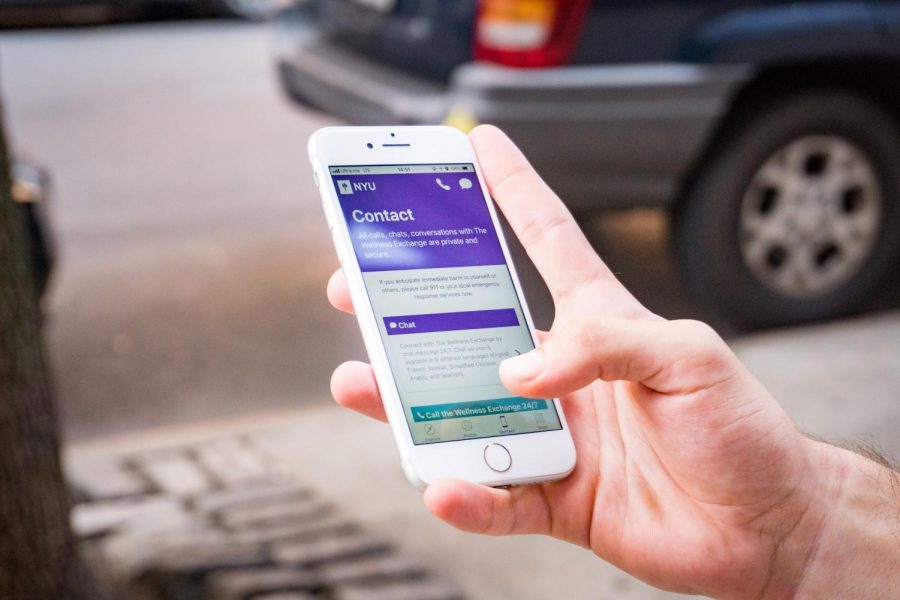One year after the Student Health Center launched an app that allows those in need of mental health services to message a counselor 24/7, some students say the concept of online therapy is impersonal but may be necessary for those dealing with long wait times for in-person appointments.
“I most likely would not [use the app] because I prefer to talk face-to-face,” Silver first-year Lidia Pietrusza said. “There have been times where I should’ve used something like that, but I didn’t want to try it because I just feel like getting a text from someone is impersonal.”
Ten students interviewed by WSN said although they appreciate the concept behind the app, they are not comfortable sharing their own issues over text.
“I probably won’t use the app,” Gallatin first-year Gabe Guadalupe said. “You lose that personal connection, the human connection.”
Similarly, GLS sophomore Jake Mauldin is also disinclined to use the app because of the lack of connection, although understands that it may be appropriate for some people.
“I feel like you lose the human sympathy in your issue,” Mauldin said. “If you want a quick response and you want to be anonymous I think that would make sense.”
According to Director of NYU’s Counseling and Wellness Services Zoe Raouzeos, there have been around 3,000 clinical chat cases as of Oct. 27 since the program’s inception in August 2018. That’s about one-sixth of the 17,000 downloads over the same time period. Even if each case represented one individual student, just 5% of NYU’s 60,000 students would have used it.
Raouzeos also said that 87% of the students who used the chat service reported they had not previously sought support from the SHC for psychological or mental health care, and three-quarters of those had never sought support from any other resource, whether NYU-affiliated or not. This suggests the app is reaching students with little experience using mental health resources.
Of the small number of students who’ve used it, some gave negative feedback in interviews with WSN — and in reviews on Apple’s App Store. The app currently has a 3.1/5 star rating based on 16 reviews.
“The idea of the app is really good and could really benefit a lot of people — but its poor execution and design just make it pointless and counter-productive,” reads a one-star review.
Other reviewers said their conversations were cut off in the middle, they had to answer repetitive survey questions and the app raised their anxiety with long wait times and transfers between representatives.
LS first-year Zishan Sun had a similar experience. She was eager to use the app due to its promise of immediate response, compared to the often long wait associated with scheduling an appointment with the Wellness Center, but her experience with the app discouraged her from using it again.
“Within the time frame of 30 minutes I received five or six replies,” Sun said. “And because the people were unresponsive, it made me hold back the information I wanted to share. It made the entire conversation way less productive.”
When Sun received her responses, she was disappointed with the comments.
“I wanted to open up, but they seemed really unprofessional,” Sun said. “I told them my problems and they would just say, ‘How can we help you?’ instead of giving me advice. They were unhelpful — they barely offered me anything at all.”
NYU psychology professor Edgar Coons said the app should not be a replacement for in-person meetings with therapists.
“There’s more that gets communicated by an in-person contact,” Coons said. “We have a lot of facial expressions, body movements and so forth that are an integral part of who we are. Any therapist will tell you that one of the cues they get about a person coming in for an interview is not just what they say, but in effect how they act.”
But when Professor Coons was told about the recent criticism the Health and Wellness Center has been facing from the NYU community regarding the sometimes month-long wait times before students are able to schedule appointments, he said the concept of a more immediate service — even online — could be beneficial.
“A sooner appointment is better than a later one, I can certainly tell you that,” Coons said. “So I guess in some ways the answer that I am giving is that to the extent that it is possible, in-person should be made available more quickly, just in general. But if to the extent that they’re not, it’s a good idea to have an over-the-internet chat.”
Similarly to Coons, LS first-year Jada Okoye thinks the concept of the app has the potential to benefit many students at NYU. However, she thinks that the SHC needs to continue pursuing other solutions that support students’ mental health.
“I definitely wouldn’t say it’s a solution, because you can’t just make an app and expect everybody to just feel OK. There definitely need to be extra steps taken to show that they care about the mental health of the students,” Okoye said. “I do think by creating the app though, it was with good intention and it was to help people.”
A version of this article appeared in the Monday, Nov. 18, 2019 print edition. Email Ronni Husmann at [email protected].


























































































































































